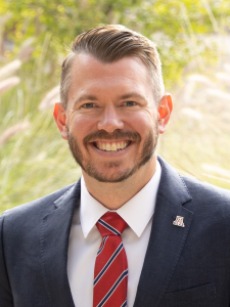
Rob Stephan is an archaeologist by training and has taught in the University of Arizona’s Department of Religious Studies and Classics since 2016. He hails from Cincinnati, OH but made the unpopular decision to attend the University of Michigan for his undergraduate studies. While in the glorious land of maize and blue he studied Classical Archaeology, Biological Anthropology, and Near Eastern Studies. Upon completing his BA in 2005, he left the Midwest to take his talents to Stanford University's PhD program in Classics. His thesis took an archaeological perspective to look at how the Roman Empire affected economic growth in the Mediterranean world, and he earned his PhD in 2014.
Rob's research interests focus on how the material remains of the past can inform us about the economic performance of ancient societies. What factors lead to improvements in economic well-being? How does political development correlate with material wealth? More recently, he’s also been researching the intersection of technology and teaching, exploring how we can use video games and virtual reality to give students a better understanding of the ancient world.
During the course of his studies, Rob has worked on archaeological excavations in Italy, Cyprus, Britain, Armenia, and the American Southwest. His current project, the Bays of East Attica Regional Survey (BEARS) uses archaeological data to investigate the bay of Porto Raphti in Greece from prehistory through the medieval period. In addition to supervising undergrads on these archaeological projects, Rob has led study abroad programs in Italy, Greece, and the Holy Land.
Rob's pursuit of teaching excellence has earned him the 2024 Leicester and Kathryn Sherrill Creative Teaching Award, the 2021 University of Arizona Five Star Faculty Award, the 2021 Gerald J. Swanson Prize for Teaching Excellence, the 2020 College of Humanities Distinguished Teaching Award, and the 2019 College of Humanities Distinguished Advising/Mentoring Award at the University of Arizona.
In his free time he likes hiking, eating nachos, and watching watching Michigan, Stanford, and Arizona on the gridiron. Bear down and Go blue!
Sample Research Presentations
Do High Production Videos Lead to Better Online Learning? (Center for University Education, Guest Speaker, 2023)
Gamifying Greece & Rome: Student Perspectives on Video Game Pedagogy (Online Learning Consortium Accelerate, 2022)
Digitzing Delphi: A Case Study in Virtual Reality Pedagogy (Computer Applications in Archaeology, 2021)
Sample Course Lectures
Akhenaten: The Heretic King (CLAS 150C1: Pyramids and Mummies: The Pharaoh in Ancient Egyptian Society)
The Ancient Olympic Games (CLAS/TLS 240: Ancient Athletics)
Sounion: Sanctuary of Poseidon (CLAS 315: The Seven Wonders of Ancient Greece)
Demeter: Goddess of the Harvest (CLAS 160D2: Classical Mythology)
The Founding of Rome (CLAS 160B1: Meet the Ancients: Gateway to Greece and Rome)
Wine Consumption in Ancient Rome (HUMS 150B1: Mind-Altering Substances in the Ancient World)

